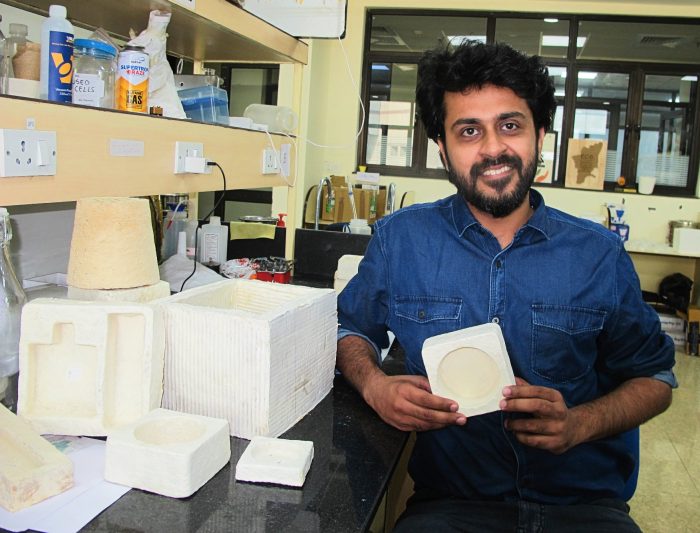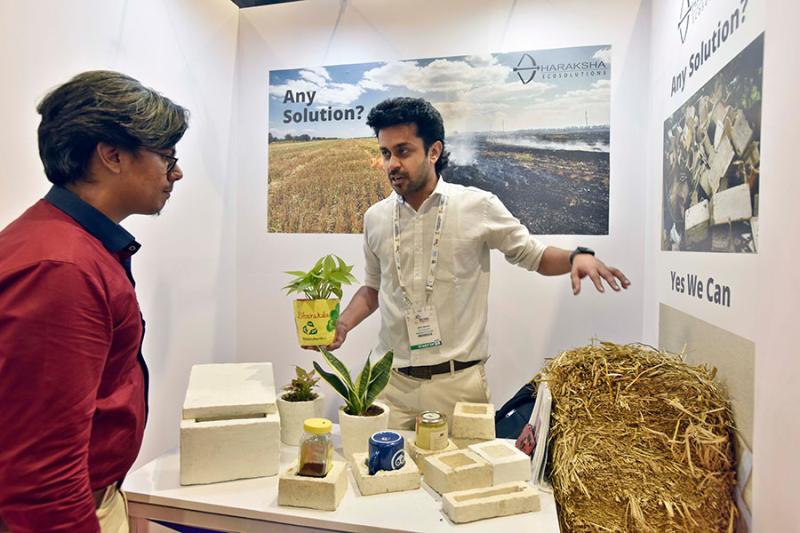(February 8, 2024) Each year, Delhi/NCR greets the sunrise under a heavy smog blanket, pushing the city’s Air Quality Index (AQI) into the alarming red zone. This concerning situation is a result of the burning of crop residues in the neighbouring states of Punjab and Haryana, which contributes to 26 percent of the capital’s air pollution. This led IIT grads Arpit Dhupar and Anand Bodh to form Dharaksha – a startup that specialises in converting rice stubble into biodegradable packaging. Started in 2019, the deep-tech startup uses a biotechnology process to produce packaging material capable of biodegrading within 60 days under standard soil conditions.

Arpit Dhupar
It all began when an innocent drawing from his nephew made Arpit think hard. A typical scenery painting had all the elements – the sun, the mountains, the sky, and birds – but the sky was coloured grey as opposed to the blue that took him aback. “We shouldn’t live in a world where we have to explain to kids that the sky should be painted blue. It should be a given,” the Forbes 30 Under 30 said in an interview. The painting gave him some food for thought, and he began building a startup that could help keep the skies blue.
It was during his sabbatical from work that he travelled through the remote villages of Punjab and Haryana to understand the grim issue of stubble burning. Upon his interactions with locals, he found that farmers were keen to get rid of the leftover crop as it was of no use to them. Due to high moisture, they can’t be used for fuel as well. So he came up with the idea of using baler machines to compress and stack the stubble and began working on Dharaksha with Anand Bodh. To solve the stubble-burning crisis, he decided to use mushrooms to degrade the stubble, which led him to conceive a biodegradable material like thermocol. Arpit realised that harvesting mushrooms on the stubble gave strength to the structure. “This wasn’t a waste material but could be a usable one. Through bio fabrication, we could use the stubble waste to create a material similar to thermocol, but one that was biodegradable,” he added.


Upon some research, he found that thermocol is worse than plastic, and burning it releases toxic gases such as carbon monoxide and about 90 different hazardous chemicals. “It’s shocking how little conversation there is around this material.” Explaining the process, he says that once the stubble makes it to the factory, it’s sterilised and the mushroom culture is added. “The mycelium grows, forming a sort of interlocked structure that holds the material in place. This makes it strong, so no resin needs to be added. The mix is then put into the oven, where the mushrooms are neutralised,” he elaborated.


This led to the making of a packaging material that’s flameproof and can endure high moisture conditions. Interestingly, each piece of material produced helps prevent 250 tonnes of thermocol from making it into landfills. “We have formed internal software and processes which enables us to keep track of each unit produced from Day 0 till the end of its life cycle. Each unit produced holds a separate identity in our systems. We manufacture 20,000 pieces per month currently and are scaling up 5x in the next few months,” said Anand, adding that companies like Dabur, V-Guard, Pernod Ricard, Nestle, Fyllo, Gourmet Jars are their customers.
“I started the venture with the aim of making the skies blue. I feel satisfied that we are making a difference,” he added.
- Follow Arpit Dhupar on LinkedIn




